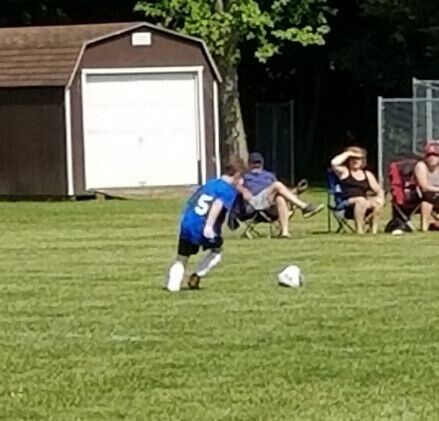Motivation
The Value of Defeat
How being on a losing soccer team was a real "win" for my son.
Posted January 7, 2022 Reviewed by Ekua Hagan
Key points
- Experiencing repeated loss taught my super-competitive son that winning isn't everything.
- A supportive coach, encouraging parents, and a connected team made the actual scores of the games far less important.
- The true victory of this experience was in the team bonds, the lessons learned, and the strength gained—both inwardly and outwardly.
My 8-year-old son began playing recreational soccer in our town’s league at the age of 5. He displayed some natural talent on the field—strength, speed, agility, and persistence. He is an extremely competitive child—he’s the type of child who’s been overturning the Sorry! board since toddlerhood if he doesn’t win. But as parents, we have never been the “let the kids win” type.
Fortunately (or, perhaps, unfortunately), the four seasons of recreational soccer that my son played were all on teams that either won or tied every game. We did not have to witness any sideline meltdowns, or any refusals to high-five the other team and say “good game” at the end—at least not from our son.
However, my husband and I knew that continually being “undefeated” does not mirror nor prepare children for “real life.” We decided that our son should play on a more competitive team where he would be challenged and could learn more about the specifics of the game. In the spring of 2021, our son tried out for and made the elite travel soccer team for a local town, and he began practicing on the team in the fall. We were all very excited and proud, but we did not know what to expect once games actually began.
What happened was that of the 8 or 9 regular-season games his team played that fall, they got pummeled in all but one. Scores were typically around 10-0, or, at best, maybe 7-2. And yet, looking back on the season, I believe this may have been one of the best experiences of my son’s young life so far.
During the first game of the season, after the opposing team marched immediately down the field and scored three or four goals in a row, my son started silently crying on the field. Notably, however, one of his teammates came up to him (unsolicited), put an arm across his shoulders, checked in to make sure he was okay and gave him a pat on the back. My son left the field, stunned, but without any kind of fit or meltdown. The ride home was quiet, and he was fearful before the next game. But I think the support of his teammates, and the camaraderie they were building, encouraged him to “get back out there.” When their next opponent dominated them again at the next game—and this happened again and again—the team’s parents became concerned that our sons would give up and stop trying.
But this is not what happened. Rather than feeling dejected and hopeless, these 2nd- and 3rd-graders became hungry to strive for every little “victory” possible. Week after week, our sons ran onto the field with energy. Week after week, they celebrated their goalies when they saved goals, and ran around on the field with their arms like airplane wings whenever they scored those few goals themselves. Week after week, their coach encouraged them and used what happened on the field to construct training at the next week’s practices.

Somehow, the lesson that we had been trying to teach our son since he first learned to move those Sorry! pieces around the board, but that had eluded him, seemed to stick when it came from his coach—winning isn’t everything. The numbers on the scoreboard don’t equate to commentary on your abilities—you can take a loss and build on it. Learn from it. Use it to your advantage in the future. My son’s gradual acceptance of that wisdom over the course of the season was a victory far beyond what could happen in any soccer game.
And he was not alone. These lessons were affecting the entire team. The boys took their performance record in stride. I can’t count how many times I heard fellow parents say, “I can’t believe my son is not more upset” after a series of tough losses. But instead of focusing on the score, the coach and the parents savored the kids’ progress and encouraged them to keep plugging on. The skills, the teamwork, and the determination they were learning made them bigger winners than any season’s scorecard could.
During the last tournament of the season, the kids lost the first game, but only 2-1. They won the second game. The third game ended in a tie—but the rules of the tournament dictated that they finish with a shootout. They ended up winning the shootout—and I have never seen a group of 7- and 8-year-olds more elated. They tackled their goalie and hugged as if they had just won the Super Bowl, the World Cup, the Olympic gold, and the lottery all at once. Having experienced so many “losses” throughout the season made the win at the end so much more meaningful!
In preparing to write this post, I searched through the psychological literature for research on the effects of winning and losing on children’s mental health and well-being. There was not much out there on this topic. I found a few studies about how children smile more when playing in teams than when playing alone, and about how children can be taught appropriate behaviors in both winning and losing situations. I also found research suggesting that parental behavior, parental control, and parental expectations all affect their child athletes’ fear of failure, and can lead to higher competitive and anxious personalities in their children, which, in turn, influences the children’s expectations and levels of hopelessness.
I do believe I witnessed some of this over the course of the past season—the kids were always happier when they were together, and the coach’s and parents’ attitudes clearly impacted the kids’. Thankfully, in our case, the coach and parents were all positive, although I have witnessed the opposite from the sidelines on other teams. In my son’s case, however, being a part of this “losing” team is most definitely going to get clocked as a “win” in his life’s record.
So while my conclusions about this experience are purely anecdotal and do not have a great deal of research-based evidence to back them, I still feel confident in the value of what my son and his team went through last fall. We can’t wait until the spring season!




